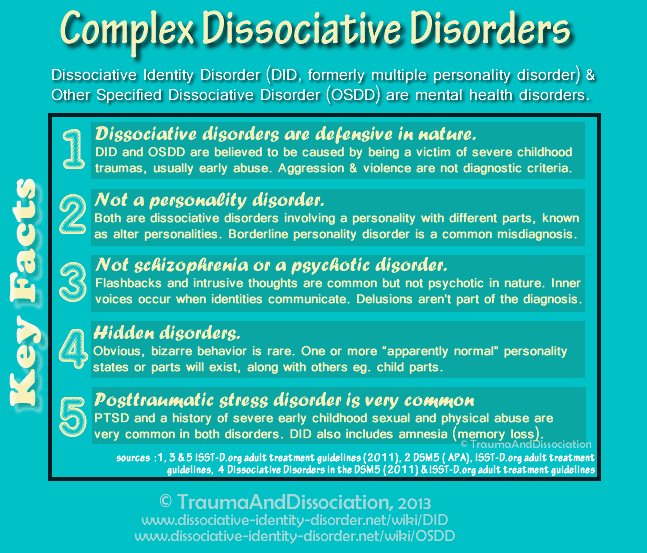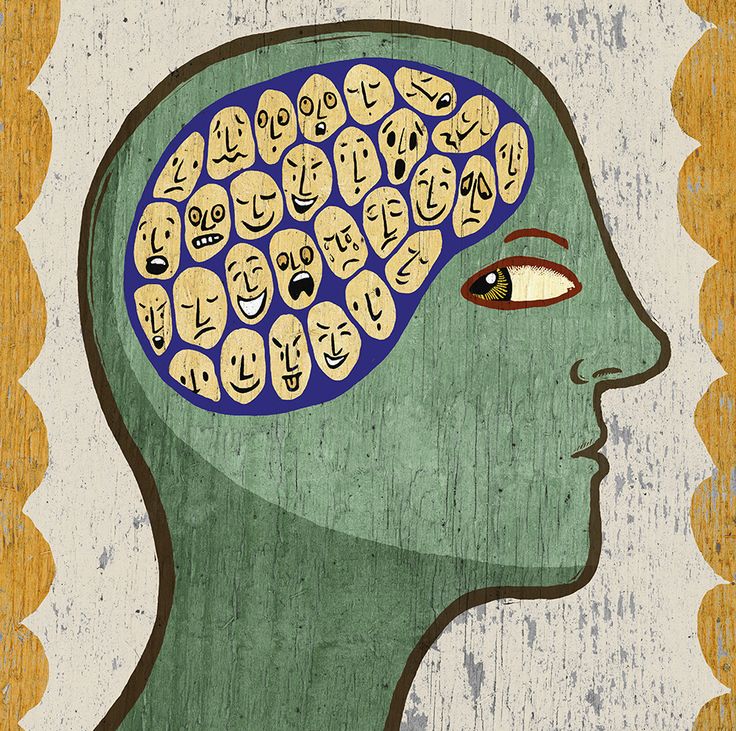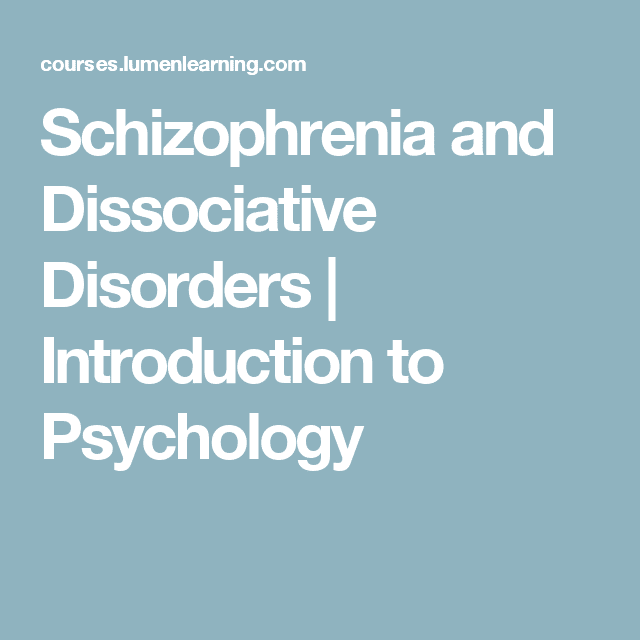How Do Dissociative Identity Disorder And Schizophrenia Differ In Their Signs And Symptoms
When a person has dissociative identity disorder, they have multiple personalities, whereas they experience hallucinations when they have schizophrenia.
Although the mind of a person with schizophrenia may be filled with mental chaos and disorder, someone with dissociative identity disorder can be extremely organized when they are in one alter.
People with schizophrenia see the world in a way that is perceived differently than normal people, but they dont have multiple distinct personalities as seen in people with a dissociative identity disorder.
Affected people of both disorders, schizophrenia and dissociated identity disorder, are seen to have memory loss , but it is more common in the latter.
- According to studies, people with dissociative personality disorder have higher rates of derealization and depersonalization.
- Depersonalization involves detachment from oneself, whereas individuals with derealization feel detached from their surroundings as if the world around them is visually distorted.
- People with schizophrenia may experience depersonalization and derealization, but this is uncommon as compared to dissociative identity disorder.
Cognitive impairment is more commonly seen in schizophrenia than in dissociative disorders.
Myth: Dissociative Identity Disorder Is The Same As Schizophrenia
Fact: Dissociative identity disorder and schizophrenia are not related.
The misconception regarding dissociative identity disorder and schizophrenia is largely caused by focusing on a few key parts of symptoms rather than the disorder as a whole. Dissociative identity disorder refers to a condition in which multiple fully formed personality alters co-exist and shift within one person. Schizophrenia is a psychotic disorder in which a person experiences extreme delusions and hallucinations.
You May Like: Simple Phobia Definition
Is Schizophrenia And Dissociative Identity Disorder The Same
People who believe that are confusing schizophrenia with a dissociative disorder known as dissociative identity disorder . Schizophrenia and dissociative disorders are both serious mental health disorders that involve different symptoms and different treatments.
What disorders are similar to dissociative identity disorder?
Acute stress disorder and post-traumatic stress disorder are closely related to dissociative disorders, sharing such symptoms as memory loss, depersonalization, or derealization.
You May Like: What Does Ptsd Feel Like
What Is The Difference Between Schizophrenia And Dissociative Identity Disorder
In this episode, W. Clay Jackson, MD, DipTH, speaks about the differences between schizophrenia and dissociative identity disorder, how patients with schizophrenia should be managed, and the gaps in the research of schizophrenia.
For more information on schizophrenia, visit the Resource Center.
W. Clay Jackson, MD, DipTh, isan assistant professor of clinical psychiatry and family medicine at the University of Tennessee College of Medicine .
TRANSCRIPTION:
Jessica Bard: Hello everyone and welcome to another installment of Podcast 360, your go-to resource for medical news and clinical updates. I’m your moderator, Jessica Bard with Consultant360, a multidisciplinary medicalinformation network.
Schizophrenia affects approximately 24 million people, or 1 in 300 people worldwide, according to the World Health Organization. Dr Clay Jackson is here to speak with us about schizophrenia today. Dr Jackson is an Assistant Professor of Clinical Psychiatry and Family Medicine at the University of Tennessee College of Medicine in Memphis, Tennessee.
Thankyou for joining us today, Dr Jackson. What are the differences between schizophrenia and dissociative identity disorder?
Jessica Bard: How should thesepatients, patients with schizophrenia be managed?
Jessica Bard: How about the gaps in the research of schizophrenia?
Jessica Bard: Is there anything else that you’d like to add today, Dr. Jackson?
People With Dissociative Identity Disorder Also Experience An Altered Sense Of Reality

Instead of imagining external voices or visual hallucinations, when a person has DID, one alter checks out and another appears in their place.
While schizophrenics are likely to experience confusion and disorder, someone with DID can be incredibly organised, provided they are in the right personality at the time.
This phenomenon is very much on a sliding scale, with some people experiencing clear multiple personalities with their own functions and characteristics, and others effectively blanking out for a period of time.
With full-blown multiple personalities, they are there to serve different functions. Some are there for the day to day things, like going to school or getting to work. Others may be aggressive, or sexual, or shy. It’s also common for different personalities to have different memories that others cannot recall.
For those who have DID in a much more diffuse sense, they have more permeability between their different states of consciousness. They may dissociate from a situation after being triggered, and then “wake up” several hours later, in a completely different place, after having finished an activity, like going to the shops.
This is why it is referred to as dissociative identity disorder in the Diagnostic and Statistical Manual of Mental Disorders , as dissociating from the outside world is what connects people with the disorder together.
Recommended Reading: Do Panic Attacks Cause Nausea
Differences In Hearing Voices
People with schizophrenia may experience auditory hallucinations, such as hearing voices. People with DID may hear voices too, with some differences. People with DID typically:
- begin hearing voices earlier in life
- hear more voices
- experience voices that talk to one another
- hear a combination of adult and child voices, whereas people with schizophrenia most often only hear adult voices
- the report they would miss the voices
Did Is Sometimes Misdiagnosed
Healthcare professionals sometimes misdiagnose DID as schizophrenia.
It can be incredibly difficult to get a correct diagnosis of DID. According to research from 2016, of U.S. clinicians were able to accurately diagnose DID in an individual.
The clinicians misdiagnosed the condition as:
Read Also: How Does Exercise Help Depression
Symptoms Of Dissociation In Ssds
Several studies examined symptoms of dissociation in schizophrenia spectrum patients through the Dissociative Experiences Scale , which is the most commonly used instrument for measuring dissociation. The questionnaire contains 28 items describing dissociative experiences. The respondent is asked to state how often they had each experience ranging from 0% to 100% of the time, resulting in mean scores ranging from 0 to 100. Mean scores for healthy controls ranged between 4.3843 and 14.8644, whereas mean scores of patients with a DD ranged between 24.9 for depersonalization disorder45 and 57.06 for multiple personality disorder .43
What Is The Difference Between Dissociative Identity Disorder Bipolar And Schizophrenia
A number of people may confuse bipolar disorder , schizophrenia and dissociative personality disorder . This confusion stems from the media commonly using these terms. However, these disorders have very little in common apart from them being stigmatised by the media and society. We will explore these in detail below.
Recommended Reading: How To Help A Binge Eating Disorder
Are There Times When You Feel As If You Are Two Different People
People with DID may have no idea about their split personality states. They only suspect something is wrong when someone else tells them about their atypical behavior, like memory loss, or a strange event. Other times, they are aware of the differences in the personalities and can feel distressed about it, although they may appear nonreactive.
Does The Bible Say God Is In Control
The hysterical neurosis dissociative type, which was Milligans diagnosis, involved alterations in the patients state of consciousness or identity to produce such symptoms as amnesia, somnambulism , fugue and multiple personality.
Dissociativeidentitydisorder used to be called multiple personality disorder. Someone diagnosed with DID may feel uncertain about their identity and who they are. They may feel the presence of other identities, each with their own names, voices, personal histories and mannerisms. The main symptoms of DID are:.
Famous People with Dissociative Identity Disorder. 1. Adam Duritz. He is an American songwriter, musician, film producer, and record producer. He is also known as the vocalist and frontman of the famous alternative rock group called Counting Crows. Most supporters of Duritz know that he suffers with dissociate identity disorder.
texas drivers license
DID symptoms, diagnostic tests and treatments. DSM-5 diagnostic criteria, DSM-IV changes, and draft ICD-11 criteria. DID and DDNOS differences. DissociativeIdentityDisorder is often misunderstood and misdiagnosed, and sometimes incorrectly called Split Personality Disorder. Read DissociativeIdentityDisorder treatment evidence and find out about new.
fedex employee years of service awards
western wear for men
Read Also: Does Ptsd Qualify For Disability
Once A Person Is Being Treated For A Dissociative Disorder How Can Family Members Best Support And Help Him/her
Be open and accepting in your responses. Do not take sides with one or another component of their identity. Rather view them as portions of the person as a whole. We are all different in different situations, but we see this as different sides of ourselves. Try to maintain that perspective with the person with dissociative disorder. Also, help them to protect themselves from any trauma, abuse, or self harm.
Bipolar Disorder Is Based On Emotions

While bipolar disorder can go hand in hand with hallucinations and delusions, what characterizes it are the alternations between very extreme moods, And that is why it falls under the category of mood disorders.
In contrast, in most cases, people with bipolar disorder they have no problem communicating consistently .
Read Also: How To Get A Service Dog For Anxiety And Ptsd
How Is Dissociative Identity Disorder Diagnosed
Making the diagnosis of dissociative identity disorder takes time. Its estimated that individuals with dissociative disorders have spent seven years in the mental health system prior to accurate diagnosis. This is common, because the list of symptoms that cause a person with a dissociative disorder to seek treatment is very similar to those of many other psychiatric diagnoses. In fact, many people who have dissociative disorders also have coexisting diagnoses of borderline or other personality disorders, depression, and anxiety.
The DSM-5 provides the following criteria to diagnose dissociative identity disorder:
Probing Question: How Do Schizophrenia And Did Differ
“What will I have for dinner?”
“Is it going to rain later?”
“I wonder what she meant by that.”
Questions or comments like these silently passing through our minds reflect how most of us think they’re normal. When the comments heard internally are the voices of other people, however, then psychiatrists suspect schizophrenia.
Among the myths surrounding schizophrenia, one of the most persistent is that it involves a “split personality,” two separate and conflicting identities sharing one brain. A National Alliance on Mental Illness survey found that 64 percent of the public shares this misconception.
“It’s an extremely common misunderstanding,” says Randon Welton, assistant professor of psychiatry at Penn State Milton S. Hershey Medical Center. “It’s based on the name. If you go to the Greek roots of the wordschizein, meaning splitting and phren, meaning mindyou have “split brain” or “split mind.” However, the intended reference is to a split between rationality and emotions, not a split within a personality, explains Welton.
Split personality, more properly, is an old name for multiple personality disorder, which is itself an outdated name for dissociative identity disorder , an officially recognized but still controversial diagnosis. Welton notes that DID came to the public’s attention following the release of books and films such as The Three Faces of Eve and Sybil, accounts of women who developed multiple, distinct personalities following severe abuse as children.
Recommended Reading: What Are The Health Risks Of Eating Disorders
Schizophrenia Vs Dissociative Identity Disorder
Do you think that Schizophrenia and Dissociative Identity Disorder are the same? The answer is NO! The public often holds a misbelief where a schizophrenic patient switches between multiple personalities. In fact, ONLY DID patients have a split personality. Today we will explain the differences between these two distinct mental disorders!
You May Like: Pristiq Information
Half Face Blades Out Of Business
DissociativeIdentityDisorder, also known as DID, or sometimes referred to as Multiple Personality Disorder, is a split in an individual’s identity characterized by two or more occurring personalities in one individual. It is characterized by each personality having their own effect, age, behavior, consciousness, memory.
Dissociativeidentitydisorder – or multiple personality disorder, as it is commonly known – affects one percent of the population, roughly the same amount as schizophrenia. Often sufferers from the condition have been misdiagnosed with schizophrenia and bipolar disorder before receiving their DID diagnosis. DID is usually.
DissociativeIdentityDisorder is a controversial diagnosis in the mental health community. There is still a divide between those who believe it is a true illness and those who feel it is a form of defense mechanism that is used to gain attention by the client. DissociativeIdentityDisorder, formerly known as Multiple Personality Disorder, has an average age.
Having a “split personality” is called Dissociative Identity Disorder. Split personalities are known as “alters,” while the body is the “host” or “system.” DID has been wrongly portrayed in film, TV, and books as linked with evil. In most cases, people with DID are the victims of abuse, not the abusers. They want you to know they are not “monsters” but are human just like you.
Don’t Miss: Can Drug Use Cause Bipolar
Chicago As Told By A Suburban Dweller
Every big city has their stereotypes, their statistics and their hot spots. Especially for those from the suburbs, these assumed truths are some of the most important points to consider when journeying to somewhere with big buildings. As I took my first trip to Chicago, I realized several things about myself and about the city itself.
The second thing I realized about myself is that I’m pretty sheltered. I learned this from the instinctual feeling I had upon arriving to watch my back, be aware of my surroundings, walk quickly and to lock the doors of the car 4 times in a row. From this, I took that no matter how cool I think I am, there is still a whole world that I haven’t experienced outside of what I am used to. When you’re somewhere new, you’re at the mercy of the environment. For me, I guess that means that I automatically felt the need to protect myself from thieves or whatever else I assumed was lurking in the shadows of the city. Ultimately, I don’t believe it’s a bad thing to be a little sheltered. Stepping outside of your comfort zone is definitely something worth exploring when you get the chance.
With love and sincerely,
I am fortunate to be a part of a family full of Tahoe getaways, taco nights, pool adventures, and random dance parties. The momentous milestones weâve supported one another with are perfect examples of the love we share. I am lucky to say that my sistersâ presences have shaped me into the woman I am today.
Multiple Identities Delusions Or Hallucinations
Some people confuse the multiple identities of DID for the delusions or hallucinations of schizophrenia, but they arent the same.
To break down the difference between these symptoms, lets define them:
- Delusions. False beliefs that are not based in reality. If you have delusions, you believe them despite evidence to the contrary, even if everyone else believes otherwise. There are many types of delusions, including grandiose, bizarre, persecutory, and somatic .
- Hallucinations. False perceptions when someone sees, hears, or feels something thats not actually happening. These sensory experiences feel real, but theyre not.
- Multiple identities. Also called alternate identities or alters, these occur when someone has more than one personality state. This alternate personality may appear to function separately from another. Alternate identities may have distinct behaviors, memories, expressions, languages, ages, and more. For instance, an alter of a 30-year-old female could be a 12-year-old male.
Recommended Reading: What To Do When Your Partner Is Depressed
Identity Disturbance Is Not Intrinsic To Schizophrenia
I imagine a diagnosis like Schizophrenia might provoke a certain amount of questioning, “Who am I?” Reconciling oneself to any serious mental illness is bound to involve some initial identity confusion. But this falls within the normal range of dissociation. Schizophrenia itself, as I understand it, really has nothing at all to do with identity, though I can guess at the likely source of the confusion: the name itself.
schizo means “to split”phrenia means “mind”
It’s easy to see how schizophrenia and dissociative identity disorder got all tangled up together. A split mind sounds at first like an apt descriptor for multiple personalities. But the mind splitting that the name schizophrenia refers to really has nothing to do with personality, with identity. Instead, it references the fractures in cognitive functioning that are the essence of this thought disorder.
How To Overcome Dissociative Identity Disorder

While theres also no cure for dissociative identity disorder, long-term treatment can be helpful, if the patient stays committed. Effective treatment includes: Psychotherapy: Also called talk therapy, the therapy is designed to work through whatever triggered and triggers the DID.
What are the root causes of dissociative identity disorder?
What Are the Root Causes of Dissociative Identity Disorder? Emotional, Physical, or Sexual Abuse. According to the Cleveland Clinic, approximately 90 percent of cases of dissociative identity disorder involve some form of long-term abuse. Accidents. Sometimes, rather than a prolonged trauma, a short-term but intense trauma can bring on the symptoms of dissociative identity disorder. Natural Disasters. War.
What is the difference between schizophrenia and split personality disorder?
Contrary to popular belief, schizophrenia is not a split-personality disorder. It is rather a damaged personality disorder. Schizophrenics hear voices and see images that do not exist. Multiple personality disorder, on the other hand, if diagnosed, necessarily means that there is a split-personality case.
What is dissociation and dissociative disorder?
Dissociation is one way the mind copes with too much stress, such as during a traumatic event. Experiences of dissociation can last for a relatively short time or for much longer . If you dissociate for a long time, especially when you are young, you may develop a dissociative disorder.
You May Like: When Does Phobia Haunted House Open